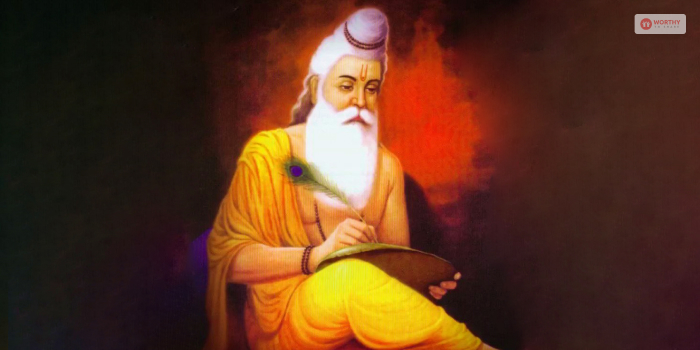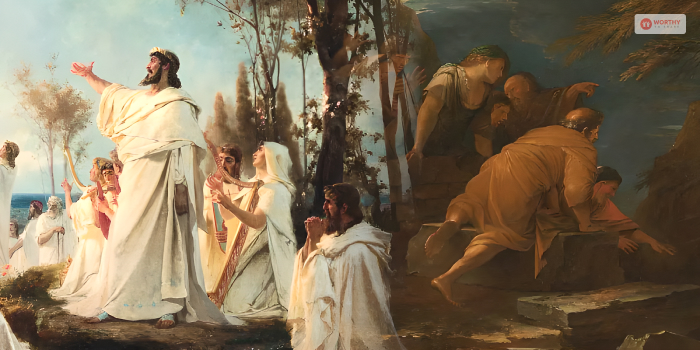What’s in a name? Everything! Many things change with the change of a word, some of which are quite unethical! I am feeling one such guilt trip right now after learning that evidence was found of the Pythagoras theorem long before Pythagorean was born!
In the article, let’s explore more about the theorem and why there is a probability that all the applause and appreciation that was to be India’s was lost to Pythagoras! You cannot call it stealing, but there are concerns about the credit being given completely at the wrong place.
Moreover, knowing that Pythagoras was not even a magician was shocking. Hence, naming a theory on a person’s name because people did not know who did is a complete hogwash. Let’s delve deeper to understand!
What Is A Pythagorean Theorem?

The theory of Pythagoras claims that the relationship of the three sides of a triangle is a function of 90 degrees. The perpendicular sides are a and b, while the diagonal side is c!
a² + b² = c²
Through this theory, if you know the measurement of at least two sides of the triangle, the third side can be calculated. This theory is beneficial when performing construction, navigation, and astronomy calculations.
The geometric theorem is quite popular, and people worldwide believe and associate this theme with the Greek philosopher and mathematician Pythagoras, but guess what? He is not a mathematician.
Further, the presence of a 3700-year-old tablet also confirms that geometry was calculated and used in calculations much before Pythagoras was even born!
Who Was Pythagoras?

Evaluating the discovery of the theorem from the historical point of view, Pythagoras of Samos, the Greek Philosopher, could not have discovered the theorem!
Even with all the knowledge and respect in the community due to his status as a spiritual guru and mystic sage, there is very little probability of Pythagoras discovering the Pythagoras theorem.
Hence, we cannot say that the theorem was stolen. Still, we can criticize the perception by stating that enough credit was not given when it was discovered that Pythagoras was not the one to find the theorem.
Did The Greeks Steal Pythagoras’ Theorem From Indians In The 12th Century?

One of the oldest books in advanced mathematics, Baudhayana Subasutra, had the actual verse or shloka that describes the Pythagoras theorem. The book, dated back to 800 BCE, had the theory listed clearly, canceling out the fact that Pythagoras discovered the idea.
There have also been other discoveries, such as old Babylonian texts and tablets from 1900 to 1600 BCE, with hints of the geometric details related to Pythagoras’ Theorem. This is where we start questioning whether there is a chance that we need to give credit at the right place.
Read more about the mystery of the existence of Pythagoras’ theorem and to whom the ownership belongs! The mathematics timeline becomes further confusing with the exposure of the evidence from prior times, and then Pythagoras needs to be clarified.
What Is the Mystery Behind The Ownership?

In a position paper by the government of Karnataka on the National Education Policy, it has been informed that there has been mention and discussion of the Pythagoras theorem long before Pythagoras’ time. This has sparked a debate worldwide!
A former IAS officer, Madan Gopal, the head of the NEP task force within the Karnataka government, shares details regarding the theory in a text known as the Baudhayana Sulbasutra. According to the history paper, the Vedic mathematicians already had a detailed knowledge of the theory now known by Pythagoreans.
Pythagoras was supposed to have lived between 570 and 490 BC. Simultaneously, the evidence suggests that the theory had been used by Vedic Indians much before that time, confirming that it is older than Pythagoras.
Was There Mathematics In Sulbasutra And Why?

According to the Historians, it was during the Yajnas that different structures were constructed, such as the altars and the fireplaces. These constructions needed to be in the shape of isosceles, triangles, rectangles, and symmetric trapezia.
Mathematics played an important role in those rituals and constructions, which were given in the Sulbasutras in a step-by-step guide. This is where the structure has been discussed by using the Pythagoras Theorem.
There is no exact proof yet of whether it is the Indians who proved the theorem or it was Pythagoras who solved it. Still, the concern remains that the theory existed before the living period of Pythagoras, which is a red flag!
Schools Have Been Teaching It All Wrong!

Over the years, we have been taught about the Pythagoras theorem, but many historians have been quite uncomfortable with this. Many of them question the previous evidence and how there is no evidence that Pythagoras was connected to mathematics.
There also have been concerns regarding the name of Pythagoras, especially related to the mathematics theory, because there has yet to be any evidence left by the contemporaries of Pythagoras who have mentioned the man in their texts, observations, and journals.
The image of Pythagoras has become popular as a successful scientist and mathematician is inappropriate. Instead, the issue arises on how misrepresented the discovery of the theory has been over the years.
What We Don’t Know?

Instead, we needed to know why Pythagoras was well known as the matter of souls and death. He was known to be a master in the knowledge of topics such as what happens to the soul after death, the concept of reincarnation, and further religious rituals.
There have also been aspects discussed regarding Pythagoras: he was a wonder-worker known to be at two places simultaneously. He believed in dietary restrictions as strict discipline is the way to growth and development.
Pythagoras was popular regarding religious rituals and how he maintained rigorous self-discipline concerning food, fitness, and growth.
And That’s How Civilization Progresses…
From School textbooks to contemporary teachings, it has been observed that Pythagoras’ theorem has been identified as someone’s work where there is a high probability that it is probably not!
The discoveries of Babylonian tablets, Vedic mathematics books from India, and other such evidence hint that Pythagoras as a philosopher had nothing to do with the discovery of the theorem!
Comment below and let us know which country can claim the Pythagoras theorem to be discovered by them.
Read Also:
















